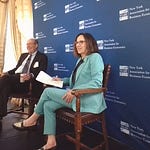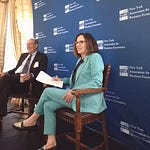Eli Remolona took over as governor of the central bank of the Philippines in July of 2023, the post-Covid period where the worst of the crisis seemed over, and the biggest challege for many of them was to keep driving inflation back into long-estblished targets.
Governor Remolona and his team have been succeeding on this path. They have continued to drive inflation down to, and below the middle of the BSP’s 2.0 to 4.0 percent target range, and taken policy steps that have helped keep the peso steady even during times of stress.
Even in the face of Trump tariff turbulence that is widely expected to slow growth around the world, the Philippines is still doing well. Looking at the potential impact of tariffs being put on countries like the Philippines, and their export-driven neighbors, the IMF this week cut their 2025 forecast for the nation’s GDP from a very strong 6.1%, down, but only to a still quite healthy, 5.0%, reflecting the economy’s strong underpinnings.
Governor Remolona’s background supports him in all of these central bank challenges. He previously worked for 14 years at the Federal Reserve Bank of New York as a Research Officer and then for 19 years at the (BIS), where he was regional head for Asia and the Pacific. He was an editor of the BIS Quarterly Review and was an associate editor for finance of the International Journal of Central Banking, as of 2005.
So dive in and hear, see why this experienced central banker, economist, and researcher is not worried about his nation’s economy getting hit hard by the threat of tariffs - threats that still hang in the air. Spoiler alert: in the Philipines consumer-driven economy, exports of manufactured goods are a small portion of their output. And the remittances sent home month after month by Phillipine workers from advanced nations around the world are a natural cushion against any tariff stresses that may hit home now.
Eli Remolona in the same boat with IMF on the outlook 00:02:04:11
We're on the same boat <as the IMF>. We're also seeing a bit of a slowdown for the Philippines, but not very much of a slowdown nonetheless. But unlike the rest of the world, we're actually seeing lower inflation for the next year or so, which gives us more degrees of freedom in terms of monetary policy.
Looking to keep growth going…00:03:07:15
<The economy> has been growing for the last several years, partly because of the demographic dividend. Consumption also has been growing. So that's been helping growth so far. And now with the global slowdown expected, that spills over into us. So we're in a slowdown ourselves maybe for the next year or so. So, we're we're beginning to ease the policy rate, that should help.
Modest openness shields Philippines from tariff impact 00:03:37:14
…we're able to ease precisely because inflation looks good for us. So in terms of tariffs, do they threaten in any way this achievement? What kind of potential negative effect or at least less growth effect could tariffs have on the Philippine economy? They will have an effect, but the effect on us is mitigated by the fact that we're not we're not a great exporting nation. We do have exports, but a lot more than our foreign neighbors. Mm hmm. But we're still exports to the rest of the world. And so if the world slows down, we will see the slowdown. We export a fair amount. About 16% to 17% of our exports go to the US, a lot of it semiconductors.
Fear the elephants! 00:05:11:06
What the bad scenario is, this fight between the United States and China. If it goes on and it's not resolved, then you get hit. There's, you know, when, two elephants fight, the grass gets trampled. I think we're kind of on the side that is in the middle of this fight between the elephants.
China opens a door to more Philippines exports 00:05:41:23
<Kathleen:>This is. Interesting to me, China's announced it's opening the door for more Philippine exports. Does that seems is that something that has any legs, do you think. <Eli> I hope so. That would be good for us. It's not part of our <Central Bank>mandate to, uh, to do something directly on that. We look at the consequences for inflation and growth. So we stick to our mandate and try to do our best. But you know what you're saying? This could help growth for the Philippines! I think so.
ELI M. REMOLONA, JR. Chairman of the Monetary Board and Governor Bangko Sentral ng Pilipinas Dr. Eli Remolona, Jr. is the seventh Governor of the BSP and Chairman of the Monetary Board.
Governor Remolona has extensive policy and operational experience in monetary policy and international finance having worked for 19 years at the Bank for International Settlements and 14 years for the Federal Reserve Bank of New York.
From 2019 to 2022, Governor Remolona served as professor of finance and director of central banking at the Asia School of Business in Kuala Lumpur. Additionally, he also taught at Williams College, Columbia University, New York University, and the University of the Philippines-School of Economics.
Before his appointment to the Monetary Board in 2022, Governor Remolona served as an independent director of the Bank for Philippine Islands (BPI) and chairman of its risk management committee. He earned his PhD in Economics with distinction from Stanford University and obtained his bachelor’s degree in Economics with honors from the Ateneo de Manila University.













Share this post